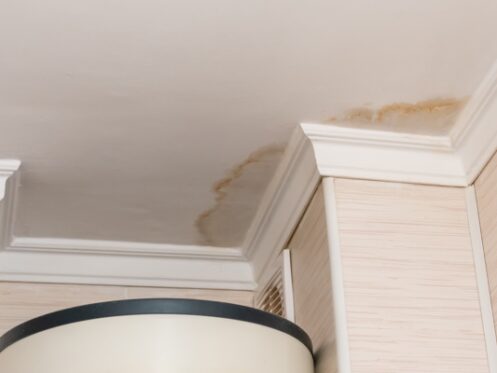Leaks are a common plumbing issue with the potential for lots of damage to your home. Just a tiny pinhole leak can ruin drywall and result in other big problems, including running up your bills and creating wastewater. One especially daunting complication with leaks is just finding them to start with. Unless a leak starts up in a visible pipe, you might not have any idea where it’s happening. Plumbers have a number of leak detection tools at their disposal to help you find any issues.
Two Kinds of Leak Detection
Water damage can be costly, but it can also be avoided. For starters, you can install a leak detection system at various points in your home’s plumbing. Second, you can also have a plumber come in and perform leak detection services.
In-home leak detection systems monitor the level of water flow through your pipes. Some of them are smart devices that are connected to a water shut-off valve. If they notice any irregularities, they can possibly shut off the water before damage happens. This is especially helpful if you are away from home.
If you don’t have a water leak detection system installed, then you can always call in a plumber to do an in-person check. This is also a good idea as a part of periodic maintenance inspections. Plumbers have different kinds of tools for detecting leaks and the training to deal with them.
Tools Plumbers Use
Plumbers have a number of different leak detection tools they can use. They also have professional training in how to use them. The easiest tool is something that plumbers typically try first. It is so easy that you can do it at home yourself if you have a municipal water intake. Find the gauge at the street where you connect to public water and note the number on the gauge. Make sure everything that uses water in your home is shut off and toilets are not running. Check back every few hours throughout the day to see if the water gauge moves and by how much. Provide this information to your plumber when they come. This helps to confirm that there is definitely a leak.
Acoustic listening devices include listening discs and ground microphones. This isn’t all that different than a doctor using a stethoscope to listen to your heart and breathing. A plumber uses sound technology to listen for the noises that dripping and escaping water might make. This can happen even when there is a concrete layer between the leak and the listening device.
Heat scanners are another option. Some areas of a home are simply too deep or noisy for acoustic methods. In such cases, a plumber can use a scanner that is able to register temperature changes. Water that is escaping usually results in shifts in temperature that will register on a monitor that is calibrated to look for it.
Video pipe inspection equipment is another option. A plumber can use a miniature camera that they have mounted on a length of fiber optic cable. This camera will send images to a monitor the plumber uses to see how the inside of a pipe actually looks. This helps them find a leak, but it also gives them the information that they need to repair that leak they find.
In-Home Water Leak Detection Technology
Plumbers can detect leaks and fix them. In-home water leak detection technology can’t fix leaks, but they can look for them all the time, which a plumber can’t do. Some of them can even shut your water supply off in the event of a leak so you that your home doesn’t get overly damaged.
Leak detection systems monitor the water in your pipes, and they do so using several different pieces of technology. That varies based on the specific system or model that you buy. Many will have sensors, however. Such sensors might use mechanical turbines to measure how much water is passing through the pipes of your home. Others might employ ultrasonic wavelengths. Certain sensors even measure water temperature so they can detect frozen pipes.
Some water leak detectors have integrated shut-off valves. You might have automatic options available, and a handful of them even have remote controls. Other systems require manual water shutoff after you get an alert about a leak.
Most smart water leak detectors have a centralized hub that connects to the Wi-Fi network in your home. You plug this hub into an available wall outlet. From there, system sensors relay data to the related app. Doing this lets you have access to live data and system control via your smartphone.
Why Should You Check for Leaks?
Whether you use a plumber’s services or install a leak detection system, there are many good reasons to check for leaks on a regular basis. Simply conserving water is the first one. Worn toilet flappers, dripping faucets, and irrigation leaks can waste a considerable amount of water over time, even if it’s not much at any given moment.
Saving money is another big reason. Most homeowners are billed for the water that they use. Water lost to leaks still counts towards this bill, even if no one in your home actually used that water. A broken sprinkler might be something that you don’t notice, but it could also be sending hundreds of gallons of water into a storm drain on a weekly basis.
Even if you don’t have leaks, detection technology can give you moment-by-moment breakdowns of how your water is being used. You might find that you and your family could take shorter showers, or you might notice you could use less water in your yard. With a growing number of locations facing water restrictions or drought conditions, this helps you use the water allotted to you.
Mold prevention is another big concern. A tiny leak under your counter can be a breeding ground for mold if you don’t know about it. If you and your family are exposed to mold, then you run certain health risks, such as asthma attacks, skin rashes, and allergic reactions.
You Need a Plumber Either Way
If you have a detection system installed to look for water leaks, then you should hire a plumber to install it. The process of installing an entire-home water leak detection system usually takes four to six hours. The cost and installation time go up or down based on local labor rates and the overall size of the system you’ve chosen.
You can also get one-time leak detection services from a plumber. These prices also vary based on the time involved and the equipment that the plumber needs to use. You might arrange such a service if you’re worried about a leak but don’t have a detection system installed. However, you can also use this service to make sure your system is working accurately and confirm the results it’s giving you.
If you decide to use a plumber’s leak detection services, then you obviously need a plumber to come out and provide them. However, you might also need a plumber to install a leak detection system for you, so you know that it’s done right. Leaks are a serious matter, so you need to be sure everything happens properly. If you live in Denver, CO, or the surrounding areas, then consult us at Summit Heating, A/C, Plumbing & Electrical for your heating, cooling, and plumbing needs. We also handle mini-splits and indoor air quality matters. Contact us at Summit Heating, A/C, Plumbing & Electrical right away for any of these services for your home.


